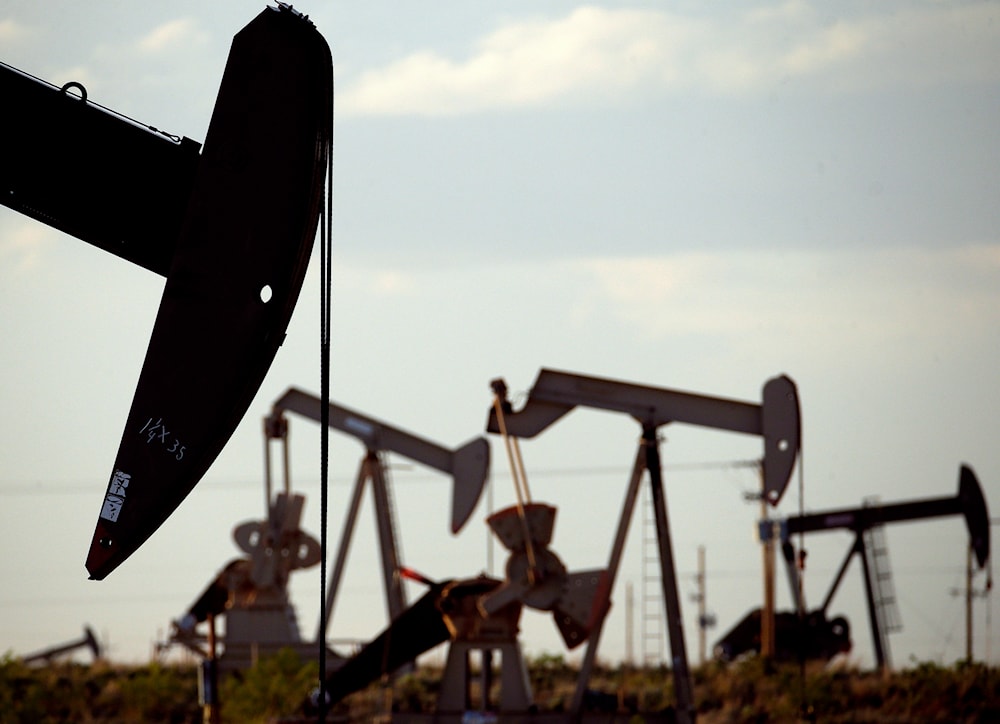Election year likely to shelve US enforcement of sanctions on Iran
The presidential election is likely to force the Biden administration to turn a blind eye to sanctions on Iranian oil, according to Bloomberg.
-

Pumpjacks work in a field near Lovington, New Mexico, the United States, on April 24, 2015. (AP)
The United States is unlikely to enforce the sanctions it announced on Iran, which would risk sending oil prices to even higher prices during the presidential election year, consultant Energy Aspects Ltd. told Bloomberg.
This comes despite recent legislative moves by the House to tighten restrictions on Iran's energy sector. The newly passed legislation aims to expand sanctions to cover foreign ports, vessels, and refineries that knowingly handle Iranian crude in violation of US regulations.
It also extends secondary sanctions to transactions between Chinese financial institutions and restricts Iranian banks involved in purchasing petroleum and oil products. As a result, Brent crude prices dropped by up to 1.7% on Monday.
According to Amrita Sen, co-founder and research director at Energy Aspects, most of Iran's oil exports are allegedly directed to China, particularly to independent refineries outside the US financial system. This situation complicates US efforts to enforce sanctions on these facilities, which operate out of its reach.
Despite Iran's increased oil shipments in the past year, which has helped stabilize oil prices, the US has been less stringent in enforcing existing sanctions, contributing to global supply. Sen highlights the political context of an election year, suggesting that strict enforcement of sanctions is unlikely as it might lead to decreased Iranian oil supplies, in turn, decreasing available oil on the global market.
"What I really want to highlight is this is a US election year, so let’s not kid ourselves,” Sen told Bloomberg. “All sanctions are sanctions on paper with anything that remotely causes all prices to go up. I just don’t see myself believing that they’re going to enforce it strongly," she added.
Sen predicts that any new restrictions could impact exports by 200,000 to 500,000 barrels per day, while Iran's average daily exports range from 1.2 million to 1.5 million barrels.
Read more: Oil hits highest level since Oct. amid fears of Iranian retaliation
US imposes sanctions on Iran
Earlier, the US House passed a bill that aims to impose sanctions on ports and refineries that engage in transactions involving Iranian oil. Additionally, the legislation seeks to tighten export controls on Iran to limit its ability to acquire materials and technology that could be used in its missile and drone programs.
The sanctions came alongside legislation targeting China and Russia, as the US continues to garner global instability via unilateral sanctions and restrictions on nations.
On the other hand, oil prices hit a yearly record of around $92 a barrel in mid-April due to geopolitical tensions in the Middle East, as price speculation grew over the world's main source of energy.
Despite American sanctions that make accessibility to the global financial market near impossible, Iran has managed to make oil sales worth $35.8 billion in the 12 months up until the end of March 2024.
Iran's head of Customs Mohammad Rezvanifar made the announcement in early April, highlighting the strength of Chinese-Iranian trade relations, which the US seeks to mitigate.
Read more: Iran signs $13bln in domestic oil production deals

 3 Min Read
3 Min Read








